Web Scraping Hotel Names, URLs, Room Counts, and Locations - Unlocking Valuable Insights for Travel Businesses
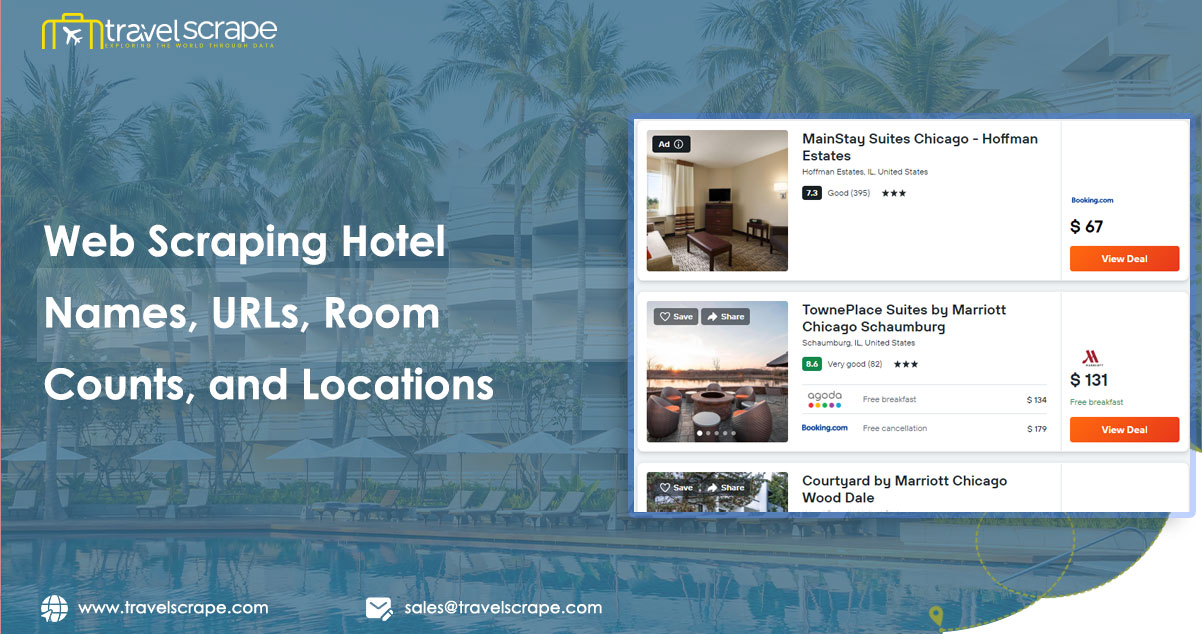
Introduction
In the highly competitive travel and hospitality industry, accurate, real-time data is crucial for businesses to stay ahead. One effective way to gather such data is through web scraping. By extracting information such as hotel names, URLs, room counts, and locations, companies can gain insights to refine their strategies, offer competitive prices, and enhance the overall customer experience.
This blog explores the significance of web scraping hotel names, URLs, room counts, and locations and how it benefits travel aggregators, travel agencies, and hotels.
We will delve into the various use cases, provide real-world examples, and showcase recent statistics highlighting the importance of Extract hotel names, URLs, rooms, and location data in today’s travel landscape.
Why Web Scraping Hotel Data is Critical
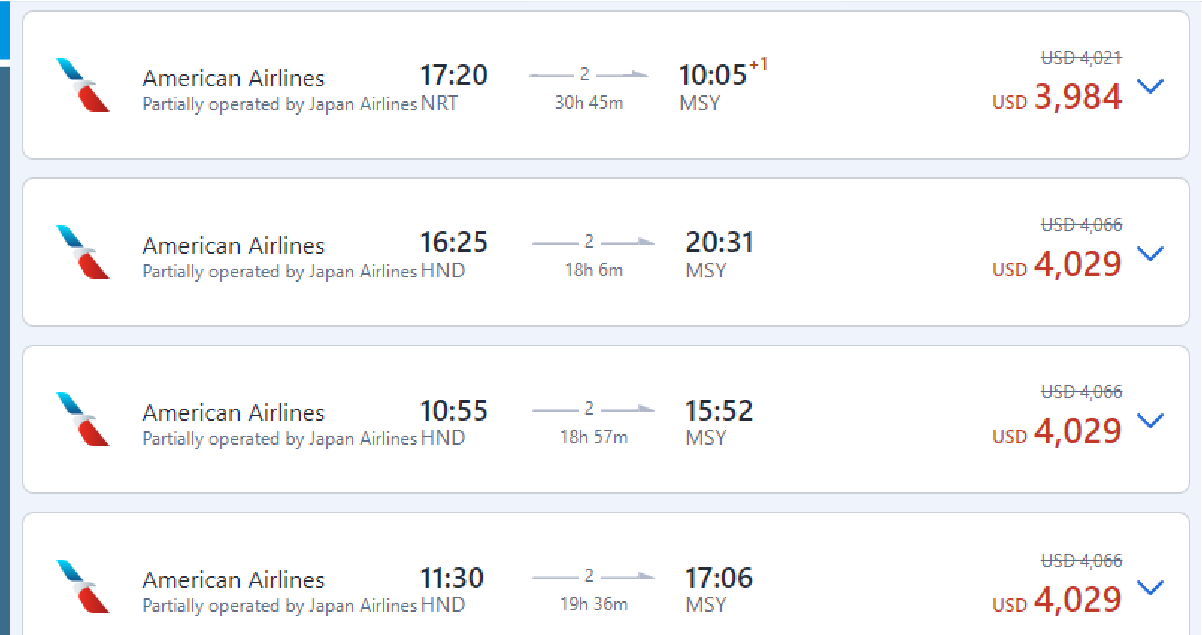
Travelers increasingly rely on online platforms like Expedia, Booking.com, and Agoda to search for hotels and make reservations. The enormous volume of data available on these platforms makes it essential for businesses to access, analyze, and act on this information. By scraping hotel data such as names, URLs, room counts, and locations, companies can:
- Analyze market trends and competitive landscapes.
- Offer dynamic pricing based on competitor data.
- Offer dynamic pricing based on competitor data.
- Optimize search results for travel agencies and websites.
Hotel Names, URLs, Rooms, and Locations data Extraction and Real Time Hotel Price Scraping are essential to Web Scraping for Hotel Data.
Key Hotel Data to Scrape
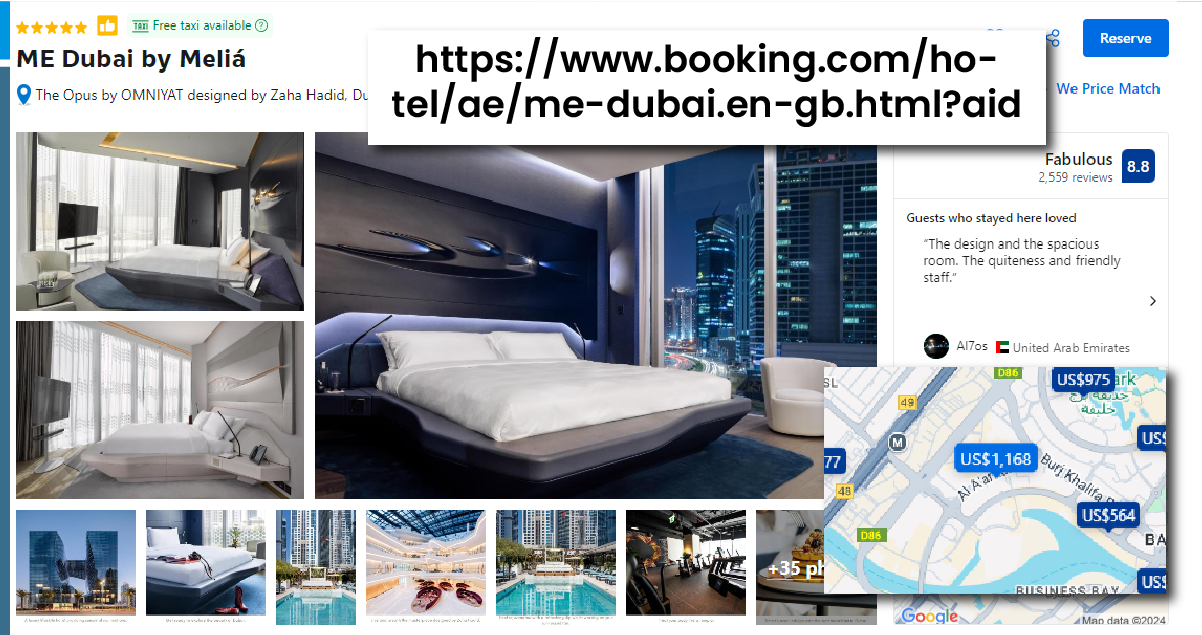
Hotel Names: Critical for identifying properties, building comprehensive listings, and improving brand visibility.
URLs: Enable quick access to hotel booking pages, reviews, and detailed descriptions.
Room Counts: Helps understand the scale of the property and its capacity to meet demand.
Locations: Vital for market segmentation, pricing strategies, and offering location-based recommendations.
Use Cases for Web Scraping Hotel Data
1. Competitive Market Analysis
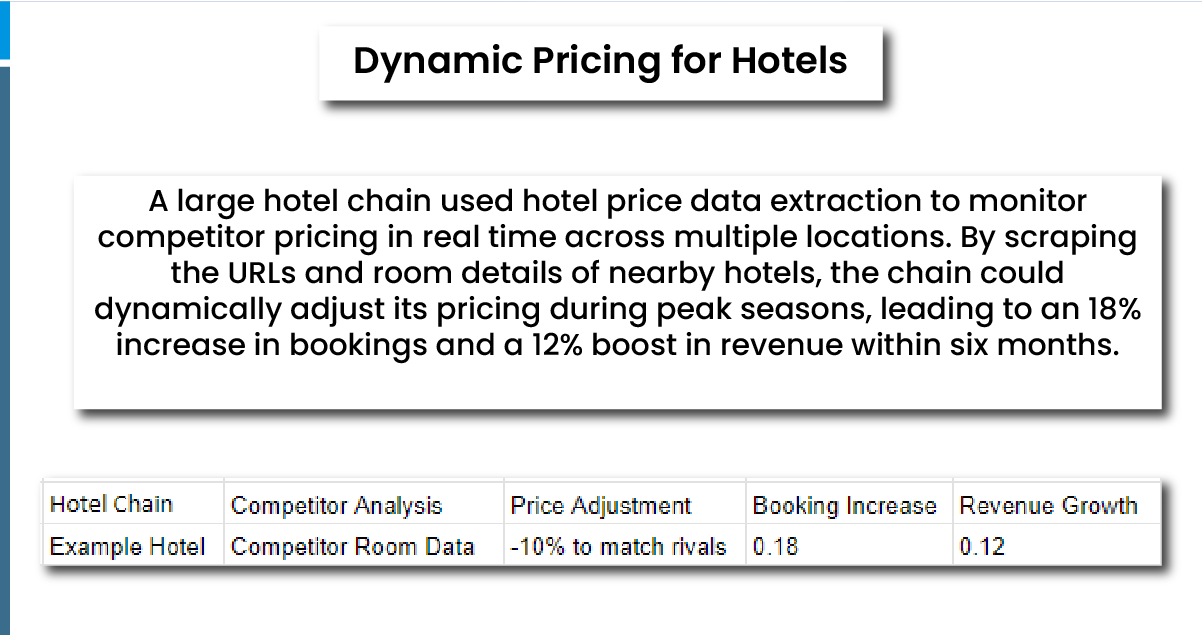
Web scraping hotel names, URLs, room counts, and locations allows businesses to analyze their competitors. Hotels and travel platforms can track competitor offerings in real time, adjust prices dynamically, and understand which properties perform better based on location, size, and amenities.
Case Study: Dynamic Pricing for Hotels
A large hotel chain used hotel price data extraction to monitor competitor pricing in real time across multiple locations. By scraping the URLs and room details of nearby hotels, the chain could dynamically adjust its pricing during peak seasons, leading to an 18% increase in bookings and a 12% boost in revenue within six months.
2. Hotel Market Intelligence
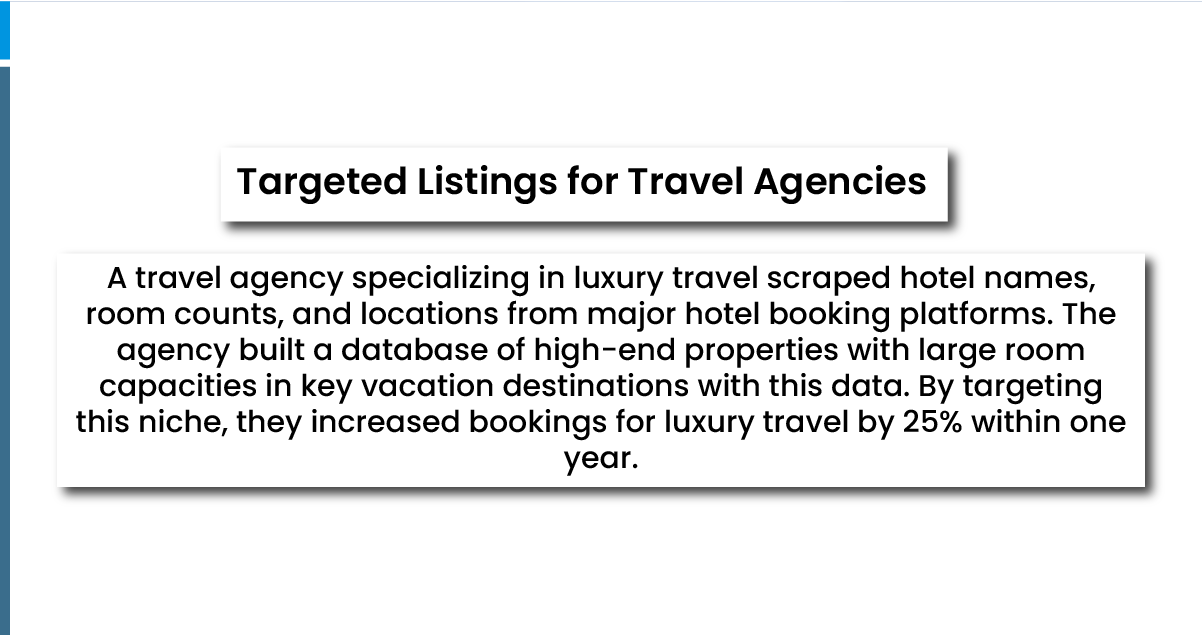
Market intelligence is critical for travel agencies and aggregators to offer the best recommendations to their customers. By scraping hotel listings data such as room counts and locations, travel agencies can build comprehensive databases that better serve travelers. Agencies can also focus on specific regions or hotel types (e.g., boutique hotels and luxury resorts), helping them differentiate their offerings.
Practical Example: Targeted Listings for Travel Agencies A travel agency specializing in luxury travel scraped hotel names, room counts, and locations from major hotel booking platforms. The agency built a database of high-end properties with large room capacities in key vacation destinations with this data. By targeting this niche, they increased bookings for luxury travel by 25% within one year.
3. Real-Time Hotel Price Tracking
One key factor that influences travelers' decisions is price. With real- time hotel price scraping, travel companies can stay on the market and offer competitive pricing. By monitoring fluctuations in hotel room pricing and availability, travel businesses can provide the best rates to customers, boosting bookings and customer satisfaction. Utilizing services that scrape hotel room pricing and reviews data allows companies to gather crucial insights, while effective hotel data scraping solutions enable them to analyze this information and refine their pricing strategies accordingly.
Example: Price Tracking for Travel Aggregators
A leading travel aggregator used real-time hotel price tracking to gather pricing data from multiple hotels across major cities. This enabled the platform to feature properties offering the best value for money. Over six months, the platform saw a 15% increase in bookings and a 10% rise in customer satisfaction ratings due to consistently offering competitive prices.
Faster query times: The flight data stored locally can be quickly queried during the day without needing real-time API calls.
4. Hotel Review Data Scraping for Customer Insights
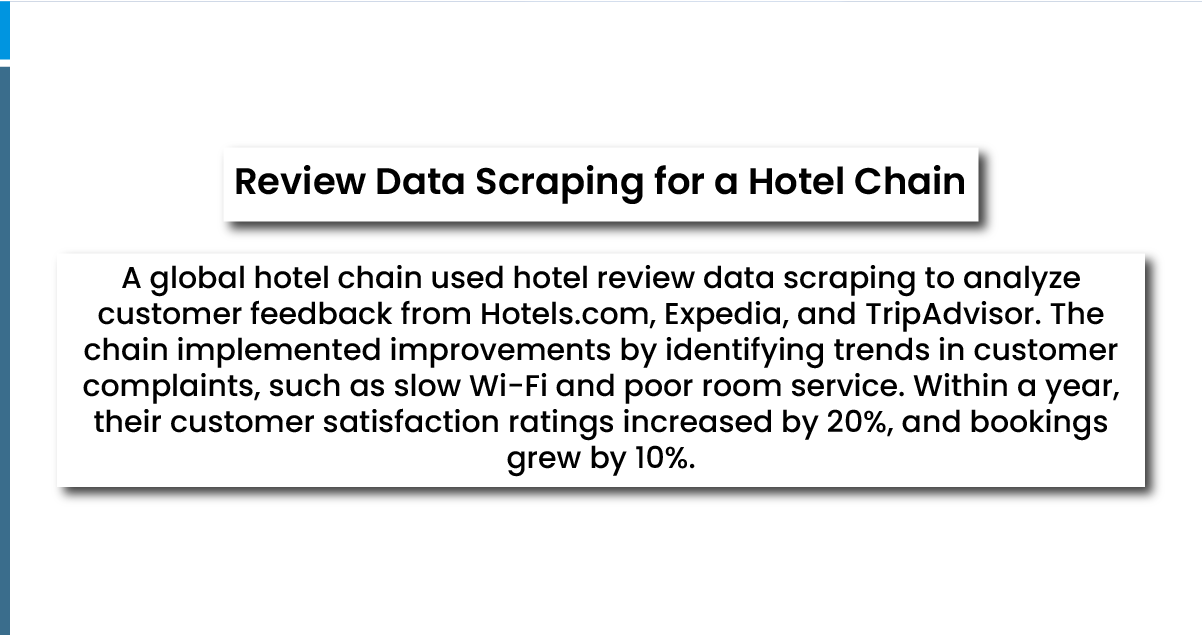
Customer reviews play a significant role in travelers’ hotel booking decisions. By scraping reviews along with hotel names, URLs, and room counts, businesses can extract valuable insights into customer sentiment, common complaints, and favorite amenities. These insights help hotels improve their services and marketing strategies, while travel platforms can highlight top-rated properties.
Case Study: Review Data Scraping for a Hotel Chain
A global hotel chain used hotel review data scraping to analyze customer feedback from Hotels.com, Expedia, and TripAdvisor. The chain implemented improvements by identifying trends in customer complaints, such as slow Wi-Fi and poor room service. Within a year, their customer satisfaction ratings increased by 20%, and bookings grew by 10%.
Technological Solutions for Hotel Data Scraping
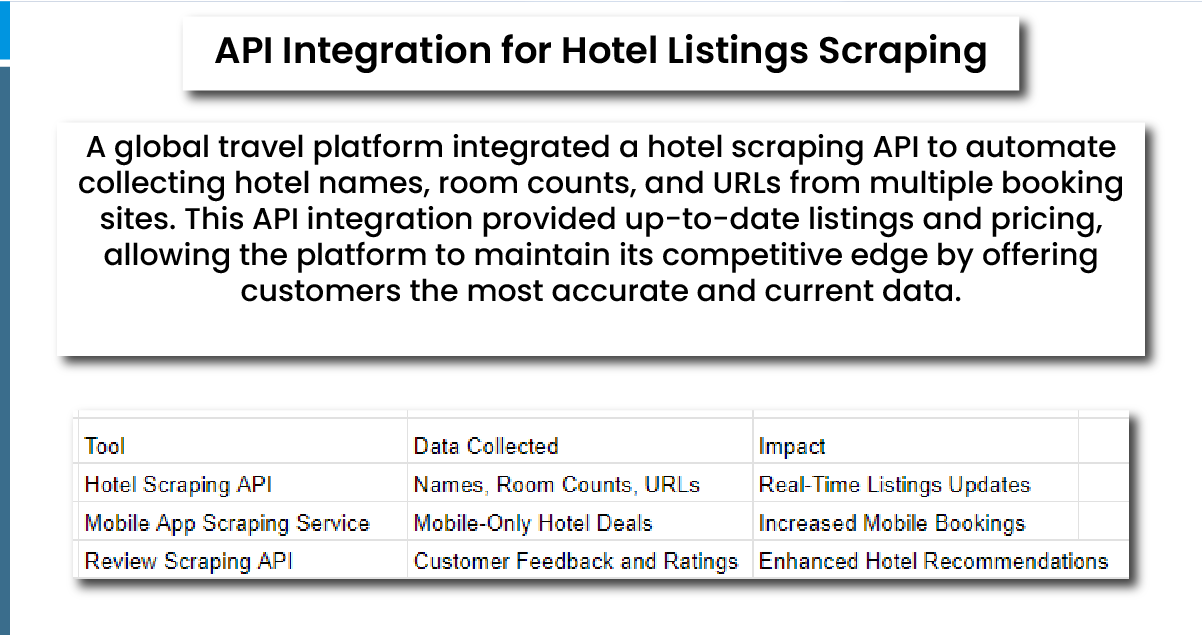
Businesses looking to scrape hotel data require the right technological tools and services. Common solutions include:
Web Scraping APIs: APIs explicitly designed for extracting structured data from hotel booking websites.
Travel Scraping Services: Comprehensive scraping solutions that gather data from multiple sources, including hotel names, URLs, and room counts.
Mobile App Scraping Services: These tools extract data from hotel apps, often providing mobile-only deals and offers.
Example: API Integration for Hotel Listings Scraping
A global travel platform integrated a hotel scraping API to automate collecting hotel names, room counts, and URLs from multiple booking sites. This API integration provided up-to-date listings and pricing, allowing the platform to maintain its competitive edge by offering customers the most accurate and current data.
Latest Stats and Trends: The Role of Data in the Hotel Industry

As of 2024, the global hotel market continues to experience strong growth, driven by increased travel demand and technological advancements. Below are some key statistics that highlight the importance of web scraping hotel data:
These statistics underscore the growing importance of digital platforms and data-driven strategies in the travel and hospitality industry.
Conclusion
At Travel Scrape, we provide comprehensive data scraping solutions tailored to the travel and hospitality industry. Whether you’re a travel aggregator or a hotel chain, our Travel Scraping API solutions help you access real-time, actionable insights to drive business growth. Contact us today to learn how our services can help you scrape hotel data for competitive analysis, real-time price tracking, and market intelligence. Additionally, we offer the capability to scrape mobile travel app data, ensuring you stay ahead in a competitive market!